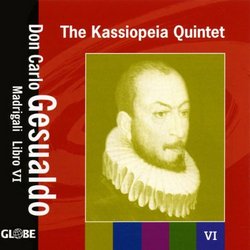This Heretic's Imprimatur!
Giordano Bruno | Wherever I am, I am. | 06/01/2010
(5 out of 5 stars)
"Five stars and then some! I have other recordings of all six "books" of madrigals by Carlo Gesualdo (1566-1613) by other ensembles. I've reviewed and praised several of those, and I won't be throwing the CDs away, but this recording of the last-published Libro Sesto of 1611 compels me to reset the bar. Good news: The Kassiopeia Quintet has already released separate CDs of the other five books. Bad news: Once you hear this one, you'll NEED to buy the others even if you have other performances. There isn't a box set, ohime!, and I'm too old to wait for one to be released.
What makes this performance so excellent? The base line for singing Gesualdo is exquisite tuning of the composer's merciless chromaticisms; Kassiopeia has such precise control of tuning that it sounds effortless, and that's true for all five voices. The quintet includes two women sopranos and two men, tenor and bass. The 'pivotal' alto line is sung by Noa Frankel, whose gender I'll leave for your ears to discover. Despite the huge challenges presented by Gesualdo's exotic voice leading, this quintet achieves the golden means of polyphony, that is, expressive rhetorical independence on all five lines together with the tightest ensemble imaginable when 'ensemble' is needed. The former is helped by the fact that the five voices are quite distinct in timbre. The latter can only be explained by really well-trained musicianship.
Once that technical authority is in place, and not before, there's room for "interpretation: flexible dynamics, effective/affective tempi, emotive phrasing, tasteful ornamentation. Kassiopeia has all that and more. My only concern for the group is that, since they've started with the best, what can they do next?
Gesualdo almost certainly wrote these 23 madrigals decades before they were published, very close in time to the production of his other madrigals, all written in response to his ecstatic exposure to the musical court of Ferrara at the time of his second marriage. Why did he hesitate to offer such astonishing music to the "public" until so much of his life had passed? Certainly a profound religious crisis intervened between his madrigals and his settings of liturgical texts. The amorous passion, the sensuality, of these madrigals must have exhausted the man's sensibilities -- deranged his already unstable personality. That's the effect they have on me, even 400 years later."
Stunning Performances of Gesualdo's Sixth Book of Madrigals
Bruce M. Adolphe | New York | 05/22/2010
(5 out of 5 stars)
"The Gesualdo Hex: Music, Myth, and MemoryGesualdo: The Man and His Music
Don Carlo Gesualdo's last book of madrigals (Book VI) contains some of the most extraordinary harmonic thinking in the history of Western music -- it lives on the edge of modality, its chromatic lines forming chord progressions that still sound fresh and unpredictable to modern ears. The Kassiopeia singers are perfect for this music, which is extremely difficult to perform because of its intervallic and harmonic complexity, its strangeness, its emotionally charged rhythmic flexibility, and its emotional instability. Gesualdo fascinated Stravinsky, Schoenberg, Ligeti, and Maxwell Davies, among many other great composers, and there is a rather bizarre film about him by Werner Herzog. If you want to enter the world of Gesualdo and have a fabulous experience, the best combination is the complete CDs of his madrigals (especially Books V and VI, which contain the most stunning music) by the Kassiopeia singers and then read the two books by Glenn Watkins, his early biography and musical portrait and his brand new book about the influence of Gesualdo in our time (The Gesualdo Hex: Music, Myth, and Memory). You will never be the same.
Bruce Adolphe"

